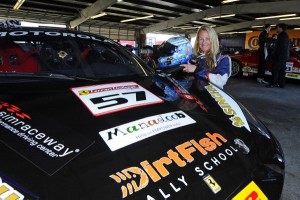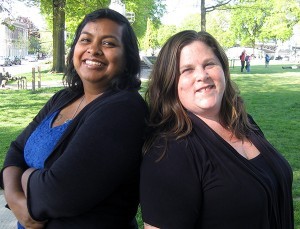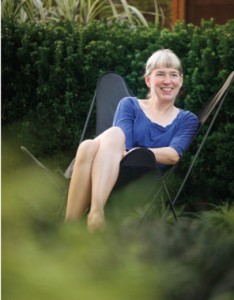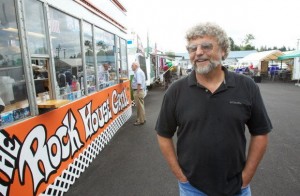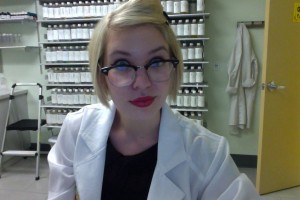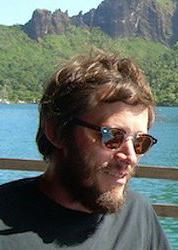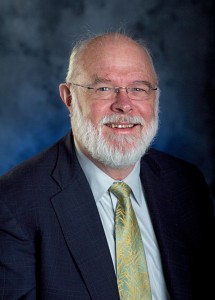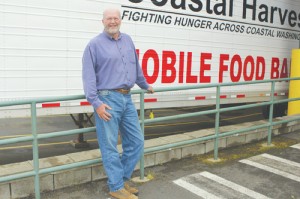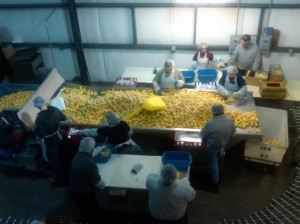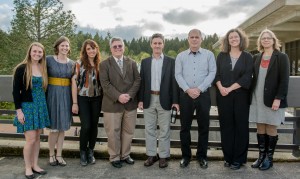Throughout years of research and development in the labs of Boo-Shoot Gardens in Mount Vernon, Washington, Jackie Heinricher ’86 was convinced the company’s research greenhouses were the hottest office spaces she would ever have. After more than 15 years as chief executive officer of the biotechnology company now called Provitro Biosciences, “Racer Jackie” stepped into an even hotter office, the inside of an unventilated race car in the Ferrari Challenge North America Series. Continue reading
Category Archives: Environment and Sustainability
Portland Greeners In The News
Two stories have come across the wires the past couple weeks about Evergreen alumni in Portland, Oregon making news.
Nancy Haque ’96 was named co-director of Basic Rights Oregon, the state’s largest nonprofit gay and transgender advocacy group.
According to LGBT Weekly, “Nancy Haque joins the Basic Rights staff after serving on the Basic Rights Board for three years and serving as a consultant on the organization’s strategic planning process this past year… Haque has more than 18 years of professional experience, including seven years as the Building Political Power Director at Western States Center, where she led a voter organizing training and empowerment project and managed the 2013 Racial Equity Report Card for Oregon. Haque also spent eight years working on economic justice issues, including stints with Portland and National Jobs with Justice and with AFL-CIO. She holds a Bachelor of Arts degree from Evergreen State College and a Master’s of Public Policy and Administration from the University of Massachusetts Amherst.”
Lauren Hall-Behrens ’94, owner of Lilyvilla Gardens, a landscape design company in Portland, was featured in Portland Monthly.
In the piece, Hall-Behrens talks about her path to landscape design after Evergreen and inspiring ideas for spring gardening and the perspectives that make her successful. Finally, she gives her top picks for planting this year, including Fairy wings and Korean feather reed grass. Enjoy this fascinating glimpse into the mind of a Greener landscape designer.
What stories from Evergreen alumni in Portland did I miss? Share your stories in the comments section.
Original Portland Timber Player and food pod pioneer Roger Goldingay ’73 looks back on 40 years
The Oregonian interviewed Roger Goldingay ’73, an original player for the Portland Timbers professional soccer team and revered Portland food pod pioneer, for their March 19 issue. Read the interview, during which they discuss the Evergreen graduate’s decision to come to Portland, his friendship with Bill Walton and the growth of soccer in the Pacific Northwest.
Roger Goldingay has been featured in the Evergreen Magazine, for the spring 2011 issue, in an article titled “The Patron of Curbside Cuisine”, and is a member of the Evergreen Author’s Directory for his book “Never Look Back”.
We can be grateful he did look back, at least this one time, for the forty year anniversary of The Portland Timbers. A lot has changed in forty years: in Portland, for Evergreen, for professional soccer and for Roger Goldingay.
Greener Scientists: Vinson Doyle ’04
Vinson Doyle ’04 recalls exactly when he realized he was going to be a Mycologist. Until winter 2004, just two quarters before graduation, Doyle had studied Botany and Organic Chemistry, but Fungal Kingdom was the “class that changed my life”. Doyle went on to earn a Ph.D at the City University of New York (CUNY) in 2012, and is already on a tenure track at Louisiana State University as an Assistant Professor of Mycology with a research emphasis on the biodiversity of fungi. Continue reading
Taylor Rose Nations ’12: Greener on Mars?
Taylor Rose Nations ’12 is one of 663 finalists in consideration to colonize Mars. The search, which began in 2013, started with over 200,000 applicants. The mission, which aims to establish a permanent human settlement on Mars, is called Mars One. Crews of four will depart every two years, starting in 2024. Continue reading
Greener Scientists: Mike Hickerson ’93
Mike Hickerson spoke with me on the phone from his lab in New York on September 10th. This is the first installment in a series called Greener Scientists.
Mike Hickerson ’93 didn’t always want to be a scientist.
At various points in his life, he’s wanted to be a hobo (many of us can relate) or a sustainable designer. After delivering pizzas and living out of his station wagon, he jumped into the only interesting program he could get into as a new Evergreen student, Great Books, and studied classic works of Western Civilization before taking the plunge into Molecule to Organism and Individual Learning Contacts (ILCs) with Steve Herman and Betty Kutter. While he recalls many of his classmates wanted to become doctors, he was motivated “less by fixing what didn’t work and more by wanting to know how things did work.” Continue reading
Derek King ’14: Saving the World One Oyster at a Time
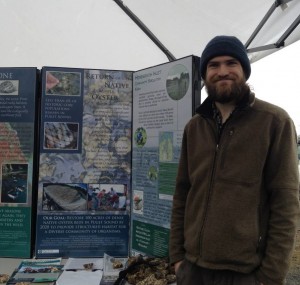
Derek King ’14 representing Puget Sound Restoration Fund at an Olympia festival. Photo Credit- Shayna Brooks
Author’s Note: As a student at The Evergreen State College from 2011-2014, I was a co-coordinator of the Evergreen Shellfish Club. We both proudly graduated in March 2014.
Later this month, Derek King ’14 will present at the annual Pacific Coast Shellfish Growers Association national conference in Vancouver, WA. A Program Technician with Puget Sound Restoration Fund, it’s no coincidence King is at the cutting edge of his field despite just being out of school. While he started with an environmental visual journalism focus, the common thread among his work and play was always the ocean. Continue reading
“Terry Oliver ’73: Saving the World One Kilowatt Hour at a Time”
Winning the “Oscars of Bonneville Power Administration (BPA),” officially known as the Administrator’s Excellence Awards Program, is a big deal at the Portland, Oregon-based nonprofit federal agency. BPA is in the energy marketing business, and Terry Oliver ’73 has been leading and directing research and development there for decades. Receiving the Administrator’s Meritorious Service Award is an acknowledgment of a career built on Oliver’s mantra: “Saving the world one kilowatt hour at a time.”
After trying everything from grassroots organizing with the now-defunct Citizens for Solar Washington to land-use planning and even working in a Minute-Mart, Terry Oliver has worked for BPA since 1981. He also took “maybe the world’s longest period of leave without pay” from BPA (from 1992 to 2000), during which he served as the Managing Director of the International Institute for Energy Conservation in Bangkok, Thailand, and worked on sustainable energy issues in the Middle East, South Africa, and throughout Asia.
Oliver studied International Relations at Evergreen, a school he chose as a community college transfer student because of its coordinated studies, and he heard it was a place to “combine things into interesting puzzles.” Evergreen was where he “learned how to learn,” which Oliver calls “the key theme” of his career. Of his “leave-without-pay” experience, Oliver recounts that he “picked up some of what I learned from a U.S. context and something from Evergreen… [getting] to recombine things in an interesting way.” When he started at BPA, managing programs like the Hood River Conservation Project was only going to be a three-year job. But with groundbreaking success on a global scale, even when Oliver returned from leave, coming back to work at BPA “was like putting a familiar shoe right back on. It was a good fit.”
In 2005, completing the circle, Terry Oliver was named BPA’s first Chief Technology Innovation Officer, responsible for energizing, focusing, and managing BPA’s research portfolio. Since then, he has restarted the BPA’s R&D program and created a publicly articulated research agenda, shifting its philosophy to “Copy people like Apple or Boeing who do R&D, not because it’s a hobby, but because it’s vital to their business.” When asked if he’s figured out the formula for success, Oliver laughs, replying, “That’s what they finally wrote up the award for!”
With such honors as this award and being named a Fellow by the Portland International Center of the Management of Engineering and Technology, Terry Oliver is able to confidently say his work “has actually delivered value to BPA.” In the R&D world, that is “a really big deal.”
Anthony Airhart ’00 Takes On Hunger in Coastal Washington
When Anthony (Tony) Airhart ‘00 arrived at Coastal Harvest in 2010, he reflects that the Hoquiam Washington based organization “was simply screaming for a collaborative, multi-dimensional, creative set of solutions to organizational woes—it needed to have someone question why things were done as they were—to look at everything with a critical view. Someone who knew how to work across boundaries and barriers to build consensus and coordinate a path forward.” Coastal Harvest started out of a pickup truck more than 25 years ago. It now delivers as much as 4 million pounds of food a year for more than 54 agencies (food banks and feeding programs), all for free, in seven counties across Southwest Washington.
Tony’s path to becoming the Executive Director of Coastal Harvest was a long, winding road that took him from “cog in the wheel” at Weyerhaeuser to where he is today. Tony attended Evergreen’s Grays Harbor Reservation-based AA Degree Bridge program, graduating at 45 years old with a bachelor’s degree in community leadership in 2000 . Although he originally enrolled while working, a facility closure at Weyerhaeuser meant he was out of a job after nearly 31 years. With his degree and experience from Evergreen, Tony got the opportunity to direct the small nonprofit, which has 6 employees, many dedicated volunteers, and an enormous daily impact.
Tony insists “the Evergreen learning style and methodology is a perfect fit in the nonprofit world. The ability to work with diverse groups and communities and having excellent communication skills are very important.” He describes the foundational role of interdisciplinary studies in preparing an executive director to wear many hats, juggle priorities, keep learning, and become proficient in a broad spectrum of topics, all while working for a diverse board of directors and with staff and community members. For Airhart, this means that “all of this information must be filtered, absorbed and analyzed, then placed against the needs, priorities, and mission of Coastal Harvest before making decisions.” In the big picture, Airhart reflected that his “years at Evergreen prepared [him] to face these challenges”.
It was a long and unexpected road for Tony Airhart, but he eventually found his passion at an organization that clearly needed a Greener.
The Living Tradition of the Rachel Carson Forum
The Rachel Carson Forum is one of the oldest traditions of Evergreen’s Graduate Program on the Environment offering the Masters of Environmental Studies (MES) degree, now approaching its 30-year anniversary. The event was established in 1990 as a tribute to Rachel Carson, a marine biologist and writer in a time when it was almost impossible for women to pursue careers as scientists. While Carson wrote several well-known books, such as The Sea Around Us and Our Ever Changing Shore, her legacy is largely tied to her groundbreaking book, Silent Spring. While the science of the environmental and human effects of pesticide application was outside her area of expertise, the book’s bold and impassioned arguments started inspired conversation and debate that helped spark the environmental movement of the 1960s.
The Rachel Carson Forum has always been organized by students of Evergreen’s MES Program. The current organizing group, the Masters of Environmental Studies Student Association (MESA), put together the 2014 panel featuring two amazing Evergreen alumni, Rhys Roth ’90, an MES graduate and Director of the Evergreen Center for Sustainable Infrastructure, and Thera Black ‘92, Senior Planner for the Thurston Regional Planning Council (TRPC). The panel also featured Richard Fealy, Senior Scientist for the National Oceanic and Atmospheric Administration (NOAA) and Nobel Prize recipient, and Andy Haub, Planning and Engineering Manager for the City of Olympia. Such an incredible group of guest speakers has come to be expected of the Rachel Carson Forum; the event has featured true giants of the environmental community, such as the late Billy Frank Jr. and mycology pioneer Paul Stamets ’80, in recent years.
Martha Henderson, Director of the MES Program, started the conversation on April 24 by recounting the lasting legacy of Rachel Carson in helping convey and rally people to complex environmental issues through strong science and communication. The panel members perfectly exemplified that mission, and the mission of the Rachel Carson Forum’s founding faculty, who Henderson conveyed, “wanted to provide images of environmental action.” Henderson emphasized that the event wasn’t just for students, but that is was “a service of MES to the broader community.”
MES leadership has always represented that philosophy, including the likes of Oscar Soule, Ralph Murphy, John Perkins, Tom Rainey, Richard Cellarius, and now Martha Henderson. Henderson’s term as director will end in late August, when she will return to teaching full time; she will take a group of students to the eastern Mediterranean region in Spring 2015. In talking about the MES Program, Henderson recalled it traditionally as a home for “Environmental Refugees” from across the country. While today’s graduate students have many schools where they may pursue a Masters in Environmental Studies degree, Evergreen’s MES program has adapted to changing times. It has three prongs of study: Climate and Energy Studies, Ecology, and Community Sustainability. Approximately 70% of the program’s students are women, an important focus of Henderson’s work as MES Director. Another important issue is global climate change, which Henderson believes will inform a shift in the focus of MES to “to help us understand alternative ways to have constructive relationships with the environment.”
Hopefully, the Rachel Carson Forum can help students, and the broader community, do just that, for the next 30 years and beyond.


